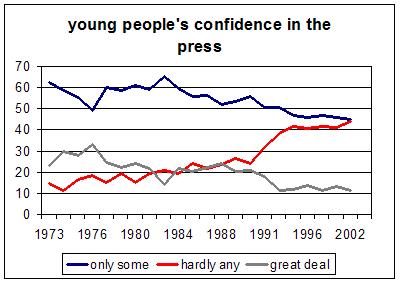Teaching:TUW - UE InfoVis WS 2008/09 - Gruppe 09 - Aufgabe 1 - Types of Data (quantitative vs. qualitative): Difference between revisions
Jump to navigation
Jump to search
No edit summary |
No edit summary |
||
| Line 1: | Line 1: | ||
{{Quotation | | =Definition= | ||
===Qualitative Data=== | |||
{{Quotation | The term qualitative is used to describe certain types of information. Qualitative data are described in terms of quality (that is, 'informal' or relative characteristics such as warmth and flavour). This is the converse of quantitative, which more precisely describes data in terms of quantity and often using a numerical figure to represent something in a statement.| from Wikipedia, Nov 2008 }} | |||
===Quantitative Data=== | |||
{{Quotation | [...] Quantitative data is data measured or identified on a numerical scale. Numerical data can be analysed using statistical methods, and results can be displayed using tables, charts, histograms and graphs. For example, a researcher will ask a questions to a participant that include words how often, how many or percentage. The answers from the questions will be numerical. [...] After the data is collected the researcher will make an analysis of the quantitative data and produce statistics.| from Wikipedia, Nov 2008 }} | |||
| Line 74: | Line 66: | ||
</table> | </table> | ||
{{Quotation | All research ultimately has a qualitative grounding | [Donald Campbell] }}{{Quotation | There's no such thing as qualitative data. Everything is either 1 or 0 | [Fred Kerlinger] }} | |||
===Example for quantitative data:=== | ===Example for quantitative data:=== | ||
[[Image:Confpress.JPG| qualitative data]] | [[Image:Confpress.JPG| qualitative data]] | ||
| Line 83: | Line 76: | ||
[Donna Roberts] Qualitative vs Quantitative Data, http://www.regentsprep.org/Regents/math/ALGEBRA/AD1/qualquant.htm<br> | [Donna Roberts] Qualitative vs Quantitative Data, http://www.regentsprep.org/Regents/math/ALGEBRA/AD1/qualquant.htm<br> | ||
[Peter Levine] http://www.peterlevine.ws/mt/archives/cat_press_criticism.html | [Peter Levine] http://www.peterlevine.ws/mt/archives/cat_press_criticism.html | ||
http://en.wikipedia.org/wiki/Quantitative_data | |||
http://en.wikipedia.org/wiki/Qualitative_data | |||
Revision as of 21:25, 25 November 2008
Definition
Qualitative Data
The term qualitative is used to describe certain types of information. Qualitative data are described in terms of quality (that is, 'informal' or relative characteristics such as warmth and flavour). This is the converse of quantitative, which more precisely describes data in terms of quantity and often using a numerical figure to represent something in a statement.
from Wikipedia, Nov 2008
Quantitative Data
[...] Quantitative data is data measured or identified on a numerical scale. Numerical data can be analysed using statistical methods, and results can be displayed using tables, charts, histograms and graphs. For example, a researcher will ask a questions to a participant that include words how often, how many or percentage. The answers from the questions will be numerical. [...] After the data is collected the researcher will make an analysis of the quantitative data and produce statistics.
from Wikipedia, Nov 2008
More
some more detailed features of
|
Qualitative data
|
vs. |
Quantitative data
|
Example: Oil Painting
|
Qualitative data:
|
Quantitative data:
|
All research ultimately has a qualitative grounding
[Donald Campbell]
There's no such thing as qualitative data. Everything is either 1 or 0
[Fred Kerlinger]
Example for quantitative data:
References
[James Neill] Qualitative versus Quantitative Research:
Key Points in a Classic Debate, http://wilderdom.com/research/QualitativeVersusQuantitativeResearch.html
[Donna Roberts] Qualitative vs Quantitative Data, http://www.regentsprep.org/Regents/math/ALGEBRA/AD1/qualquant.htm
[Peter Levine] http://www.peterlevine.ws/mt/archives/cat_press_criticism.html
http://en.wikipedia.org/wiki/Quantitative_data
http://en.wikipedia.org/wiki/Qualitative_data
